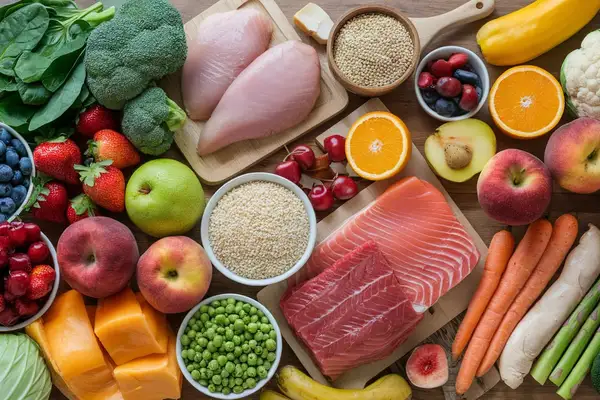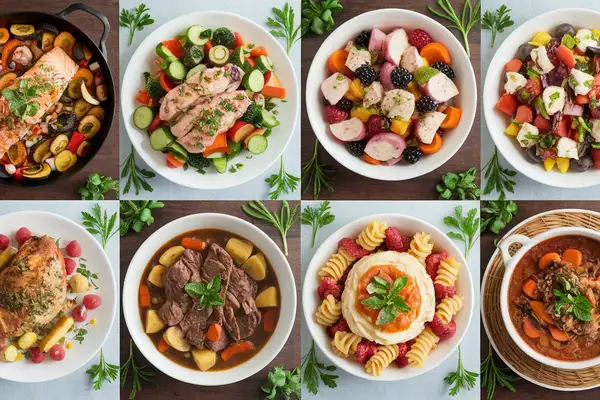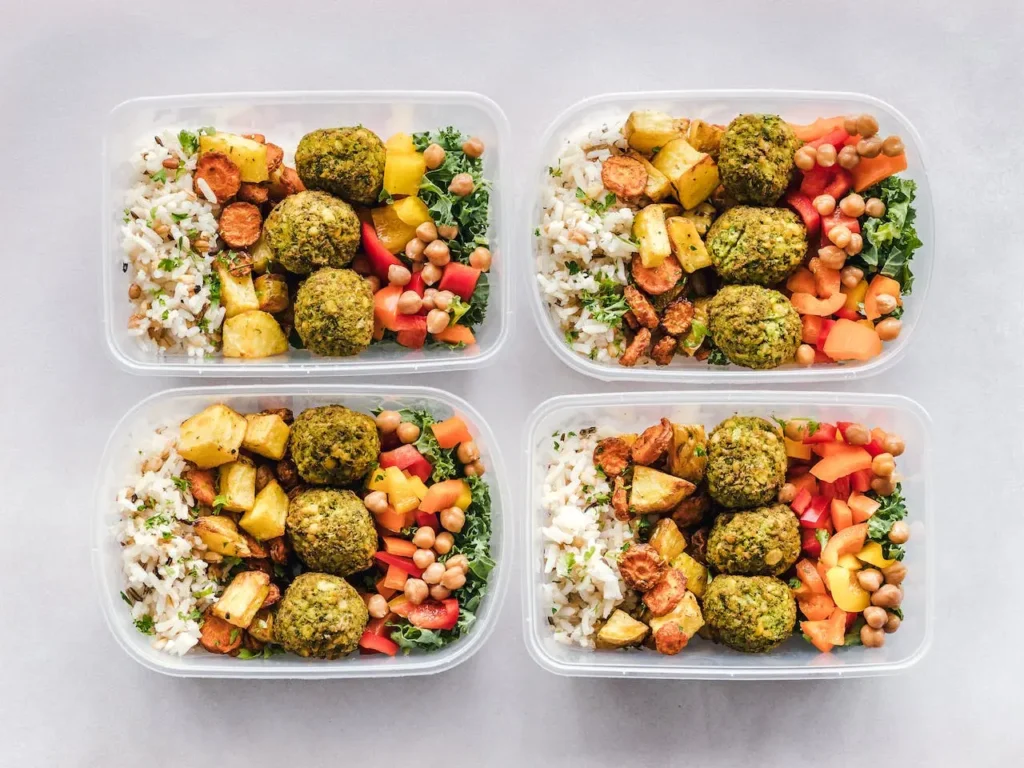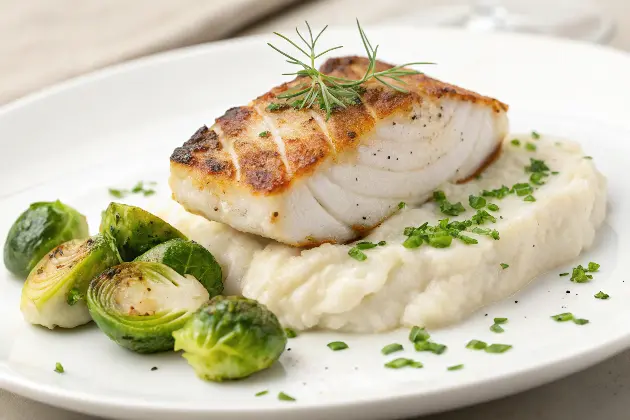7 Day 1600 Calorie Meal Plan High Protein
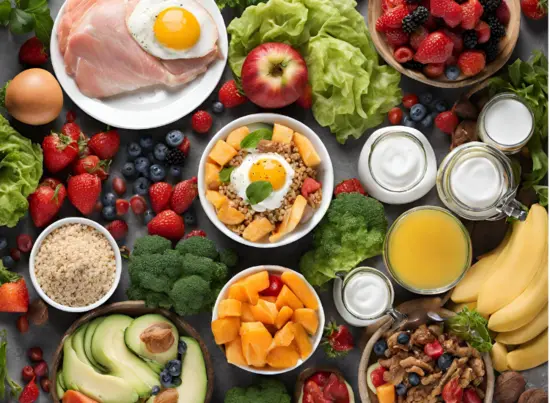
What is a 1600 Calorie Meal Plan?
This post may contain affiliate links, meaning I may earn a commission if you make a purchase, at no extra cost to you. I only recommend products I trust. Thank you for your support.
A 1600 calorie meal plan is a structured eating plan designed to provide approximately 1600 calories per day through a balance of macronutrients to support weight management and overall health.
Embarking on a weight loss journey often involves meticulous planning and dedication, especially when it comes to maintaining a balanced and controlled diet.
In recent times, the 1600 calorie meal plan has gained significant attention as a viable option for individuals aiming to shed excess pounds while still ensuring their bodies receive the necessary nutrients.
We have curated a comprehensive 7 day 1600 calorie meal plan high protein that provides a delicious array of low calorie high protein meals, within the recommended 1600 calories a day.
If you’re ready to kick-start your weight loss journey with a carefully crafted meal plan that prioritizes both nutrition and flavor, then look no further.
This meal plan is designed to show that a 1600 calorie intake can be both fulfilling and effective for weight loss when approached with the right foods and balance.
Is 1600 Calories a Day Enough to Lose Weight?
Yes, 1600 calories can be sufficient for weight loss for many individuals, especially when combined with regular physical activity.
It’s important to focus on the quality of the calories consumed rather than just the quantity. A high protein 1600 calorie meal plan, like the one we outline below, can help preserve muscle mass, keep you feeling full, and support your weight loss goals.
Remember, weight loss should be gradual and sustainable. Rapid weight loss can lead to muscle loss and nutrient deficiencies, which are not conducive to long-term success. It’s always best to aim for a balanced and nutritious approach to weight loss.
7 Day 1600 Calorie Meal Plan High Protein
This 7 day 1600 calorie meal plan is includes low calorie high protein meals that are balanced, and designed to support weight management, muscle maintenance, and overall health.
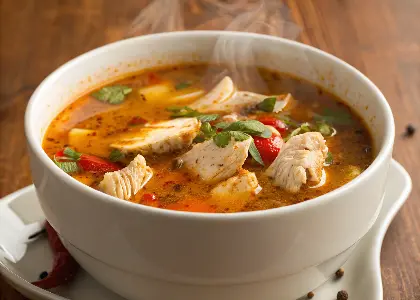
Day 1
Total: 1606 calories & 150.4g Protein
Breakfast (249 calories):
- Turkey, Ham, and Avocado on Rye: Hearty rye bread layered with deli turkey, a slice of ham, creamy avocado, fresh tomato slices, and lettuce. (2 slices rye bread, 3 slices deli turkey, 1 slice ham, 3 tomato slices, 1 lettuce leaf, ¼ avocado)
Lunch (450.4 calories):
- Cottage Cheese and Hummus Sandwich: A protein-packed sandwich of multigrain bread filled with cottage cheese and hummus, wrapped with crisp lettuce. (2 multigrain bread slices, ¼ cup cottage cheese, ¼ cup hummus, 2 lettuce leaves)
- Easy Spinach and Scallion Salad: Fresh spinach tossed with scallions, lemon juice, olive oil, and pepper for a light side salad. (5 cups spinach, 2 scallions, 1 tbsp olive oil, ¼ lemon juice, pepper)
Dinner (472.6 calories):
- Spicy Chicken Soup: Warm, zesty soup made with chicken, lime juice, cilantro, cayenne, and a mix of vegetables. (½ chicken breast, cilantro, cayenne pepper, lime juice, ¼ avocado, ½ carrot, ½ potato)
- Mediterranean Salad: A fresh mix of lettuce, kidney beans, cucumber, and hummus with a red wine vinegar dressing. (1½ cups shredded lettuce, ⅜ cucumber, ⅜ cup kidney beans, 1½ tbsp hummus, 1½ tbsp red wine vinegar, oregano)
Snacks (434 calories):
- Blueberry Protein Pudding: A creamy high-protein pudding made with Greek yogurt, blueberries, and protein powder. (½ cup Greek yogurt, 1 scoop protein powder, 1¾ oz frozen blueberries)
- Almonds and Blueberries Yogurt Snack: Greek yogurt served with blueberries and almonds for a quick, satisfying snack. (¾ cup Greek yogurt, ½ cup blueberries, 10 almonds)
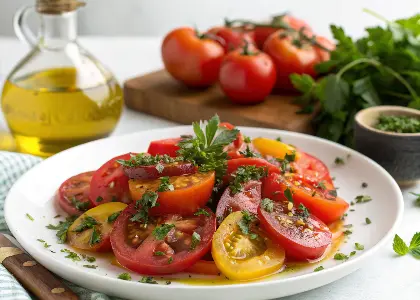
Day 2
Total: 1603.7 calories & 105.7g Protein
Breakfast (355 calories):
- Broccoli Hash with Fried Egg: Savory broccoli hash with quinoa, herbs, and a fried egg for a nutrient-rich start. (2 tbsp cooked quinoa, olive oil, lime juice, 3 cups broccoli, ⅛ cup ginger, 1 cup spinach, scallion, cilantro, chia seeds, 1 egg)
Lunch (426.6 calories):
- Creamy Green Chia Smoothie: A thick green smoothie with banana, spinach, chia, and protein for lasting energy. (1 cup almond milk, ½ tbsp chia seeds, 1 tbsp coconut oil, 1 scoop protein powder, 1 cup spinach, 1 banana, ½ tsp vanilla)
- Lebanese Thyme Tomato Salad: A herby tomato salad with thyme, onions, and lemon-olive oil dressing. (2 tbsp thyme, 2 tbsp chopped onions, 2 tbsp tomatoes, 1 tbsp lemon juice, 1 tsp olive oil, salt)
Dinner (548 calories):
- Balsamic Chicken with Spinach and Barley: Juicy chicken breast with balsamic-glazed spinach and hearty barley. (¼ cup barley, ¾ tsp olive oil, garlic, ½ chicken breast, 1⅞ cup spinach, ½ tbsp balsamic vinegar, chicken broth)
- Fire Roasted Tomatoes with Cheese: Smoky roasted tomatoes topped with melted cheddar. (1 cup fire roasted tomatoes, salt, 1 oz cheddar)
Snacks (274.1 calories):
- High Potassium Fruit Salad: A light, potassium-rich mix of melon, berries, and creamy yogurt. (¼ cup watermelon, cantaloupe, strawberries, 1½ oz Greek yogurt)
- Avocado Chickpea Lettuce Wraps: Mashed avocado and chickpeas with crisp veggies in a lettuce leaf. (¼ avocado, celery, scallions, lemon juice, chickpeas, cucumber, 1 lettuce leaf)
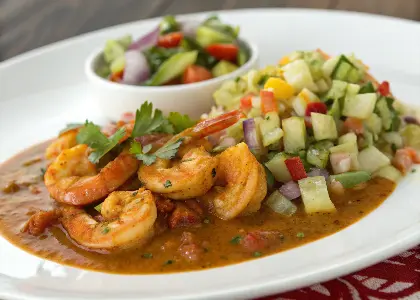
Day 3
Total: 1601.6 calories & 121g Protein
Breakfast (292 calories):
- Raspberry Peanut Butter Protein Smoothie: A fruity and creamy protein smoothie with raspberries and peanut butter. (1 tbsp peanut butter, ½ cup almond milk, ¾ cup raspberries, 1 scoop protein powder, ½ cup ice)
Lunch (433.3 calories):
- Lemon-Pepper Tuna Sandwich: Zesty tuna sandwich with arugula and olive oil on rye bread. (3 oz tuna, parsley, 2 slices rye bread, 1 cup arugula, ½ tsp olive oil, lemon juice)
- Light Raspberry Yogurt: Greek yogurt with raspberries and a hint of honey. (6 oz Greek yogurt, 5 raspberries, 1 tsp honey)
Dinner (549.4 calories):
- Shrimp Curry: Spicy shrimp sautéed in curry paste with garlic and cilantro. (8 oz shrimp, garlic, 2 tbsp curry paste, cilantro, 1 tbsp olive oil)
- Chopped Salad: Simple side salad of cucumbers and tomatoes dressed with lemon juice and olive oil. (cherry tomatoes, cucumbers, lemon juice, olive oil, salt)
Snacks (326.9 calories):
- Banana: A ripe, energy-boosting banana. (1 medium)
- Pineapple Blueberry Bran Parfait: Greek yogurt layered with bran flakes, fruit, and crunchy cashews. (⅜ cup Greek yogurt, blueberries, ¼ cup bran flakes, pineapple, cashews)
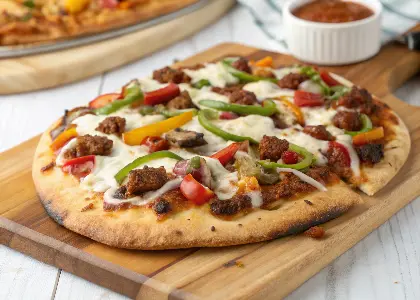
Day 4
Total: 1604.3 calories & 125.3g Protein
Breakfast (337.8 calories):
- Emmental Cheese, Tomato, and Arugula Omelet: Fluffy omelet made with eggs, melted Emmentaler, fresh tomato, and peppery arugula. (2 eggs, 1 oz Emmentaler cheese, 1½ cups arugula, 1 tomato)
Lunch (405.7 calories):
- Southwestern Salad with Black Beans: A fresh mix of lettuce, corn, black beans, and cherry tomatoes tossed with garlic. (3 cups lettuce, ½ cup corn, ½ cup black beans, cherry tomatoes, garlic)
- Carrots with Hummus: Crisp carrot sticks served with creamy hummus. (1 cup carrots, 5 tbsp hummus)
Dinner (558.8 calories):
- Dinner Pita Pizza: Whole grain pita topped with tofu, spinach, mozzarella, parmesan, and tomatoes. (1 large whole grain pita, 4½ oz tofu, ½ cup spinach, ¼ cup mozzarella, 1 tbsp parmesan, 4 tomatoes)
- Cauliflower and Tahini: Roasted cauliflower with a drizzle of tahini. (1 cup cauliflower, 2 tbsp tahini)
Snacks (302 calories):
- Trail Mix: A sweet and salty combo of almonds, raisins, and cashews. (10 almonds, 1 tbsp raisins, 1 tbsp cashews)
- Creamy Cucumber Yogurt Dip: Creamy Greek yogurt with chopped cucumber and herbs. (½ cup Greek yogurt, ½ cucumber, herbs)
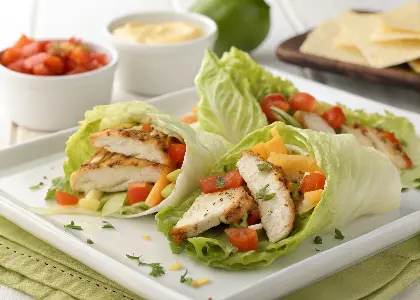
Day 5
Total: 1607.3 calories & 131.6g Protein
Breakfast (259.8 calories):
- Yogurt with Walnuts & Honey: Creamy Greek yogurt topped with walnuts and a drizzle of honey. (1 cup Greek yogurt, ⅛ cup walnuts, 1 tsp honey)
Lunch (434.8 calories):
- Chicken and Swiss Lettuce Wrap: Thinly sliced chicken and Swiss cheese wrapped in crisp lettuce leaves with mustard. (1 slice chicken breast, 1 oz Swiss cheese, mustard)
- Feta Cucumber Boats: Halved cucumbers filled with feta, seasoned with dill and black pepper. (3 cucumbers, 3 oz feta, dill, pepper)
Dinner (511.7 calories):
- Zucchini Noodles: Spiralized zucchini stir-fried with garlic, soy sauce, sriracha, brown sugar, and olive oil. (2 zucchini, garlic, soy sauce, sriracha, brown sugar, olive oil)
- Roasted Red Pepper Chicken Wrap: Chicken wrapped in a tortilla with cottage cheese, cheddar, salad mix, and red peppers. (3 oz chicken, ½ tortilla, Dijon mustard, cottage cheese, cheddar, salad mix, red peppers)
Snacks (401 calories):
- Cottage Cheese & Pineapple: Cottage cheese with sweet pineapple chunks. (1 cup cottage cheese, ½ cup pineapple)
- Cinnamon Blueberry Smoothie: Blended blueberries, yogurt, cinnamon, chia seeds, ice, and water. (½ cup blueberries, ½ cup Greek yogurt, 1 tbsp cinnamon, chia seeds, ice, water)
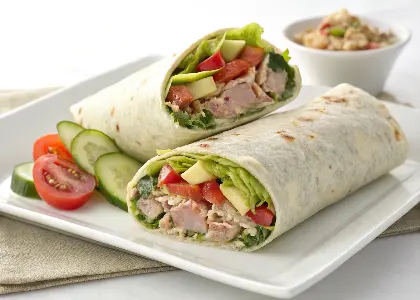
Day 6
Total: 1601.6 calories & 106.3g Protein
Breakfast (217 calories):
- Almond Butter & Honey Toast: Toasted whole grain bread with almond butter, butter, and honey. (1 slice whole grain bread, 1 tbsp almond butter, 1 tsp butter, ¾ tsp honey)
Lunch (471.2 calories):
- Tuna Salad Wrap: Tuna wrapped in a tortilla with corn, cucumber, bell pepper, and shredded lettuce. (tortilla, ½ can tuna, corn, cucumber, bell pepper, shredded lettuce)
- Brie and Celery: Soft brie cheese served with fresh celery sticks. (2 celery stalks, 1 oz brie)
Dinner (542.6 calories):
- Fennel & Chicken Flatbread: Flatbread with grilled chicken, provolone, roasted fennel, and red bell pepper. (1 pita, ½ chicken breast, ¼ cup provolone, ¼ fennel, ¼ cup red bell pepper, ½ tsp olive oil)
- Creamy Coleslaw: Shredded cabbage and carrots tossed with light mayo, vinegar, and sugar. (cabbage, carrot, light mayo, vinegar, sugar)
Snacks (370.8 calories):
- Plum and Greek Yogurt: Sliced plum with creamy Greek yogurt and almonds. (½ plum, 6 oz Greek yogurt, 10 almonds)
- Rice Cake with Peanut Butter & Dried Cherries: Rice cake topped with peanut butter, coconut flakes, and dried cherries. (rice cake, coconut flakes, 1 tbsp peanut butter, 10g dried cherries)
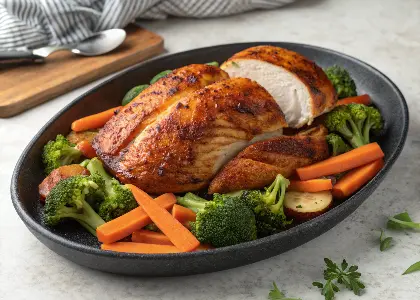
Day 7
Total: 1609 calories & 138.4g Protein
Breakfast (242.3 calories):
- Banana Protein Pancakes: Fluffy pancakes made with egg, banana, and protein powder, lightly sweetened with stevia. (½ egg, ¾ scoop protein powder, ½ banana, stevia, baking powder)
Lunch (501.4 calories):
- Grilled Chicken Wrap: Whole wheat wrap filled with grilled chicken, spinach, and hummus. (½ chicken breast, whole wheat wrap, 1 tbsp hummus, spinach)
- Cucumber Lemon Salad: Refreshing salad of cucumber, corn, carrot, and dill with lemon and olive oil. (½ cucumber, ½ cup corn, olive oil, dill, carrot, lemon juice)
Dinner (575.3 calories):
- Smoked Paprika Chicken: Pan-seared chicken breasts seasoned with paprika, garlic powder, parsley, and olive oil. (2 chicken breasts, paprika, garlic powder, parsley, olive oil)
- Steamed Broccoli and Carrots: Lightly steamed veggies seasoned with olive oil and pepper. (1 cup broccoli, ½ cup carrots, 1 tsp olive oil)
Snacks (290 calories):
- Cottage Cheese and Berries: High-protein cottage cheese topped with blueberries. (½ cup cottage cheese, ¼ cup blueberries)
- Boiled Egg and a Handful of Almonds: Simple and satisfying snack. (1 boiled egg, 10 almonds)
1600 Calorie Diet Food List
When creating a 1600 calorie meal plan for weight loss, it’s essential to include a variety of nutrient dense foods to ensure you’re meeting your nutritional needs while managing your calorie intake.
Here are some foods to consider including in your 1600 calorie meal plan:
1. Protein Sources
- Skinless chicken breast
- Turkey
- Fish (such as salmon, tuna, or trout)
- Tofu
- Lentils
- Quinoa
- Greek yogurt
- Eggs
2. Whole Grains
- Brown rice
- Quinoa
- Barley
- Oats
- Whole grain bread
- Whole grain pasta
3. Fruits
- Berries (strawberries, blueberries, raspberries)
- Apples
- Oranges
- Bananas
- Kiwi
- Pears
4. Vegetables
- Leafy greens (spinach, kale, Swiss chard)
- Broccoli
- Cauliflower
- Bell peppers
- Carrots
- Cucumbers
- Tomatoes
5. Healthy Fats
- Avocado
- Nuts (almonds, walnuts, cashews)
- Seeds (chia seeds, flaxseeds, pumpkin seeds)
- Olive oil
6. Dairy or Dairy Alternatives
- Low-fat milk
- Greek yogurt
- Cheese (in moderation)
- Unsweetened almond milk or soy milk
7. Legumes
- Chickpeas
- Black beans
- Kidney beans
- Lentils
8. Additional Foods
- Herbs and spices for flavor without added calories
- Tofu or tempeh
- Hummus
- Nut butter (in moderation)
Foods to Avoid in a 1600 Calorie Meal Plan
When creating a 1600 calorie meal plan for weight loss, it’s important to be mindful of the types of foods that can contribute excess calories, unhealthy fats, and added sugars.
Here are some foods to consider minimizing or avoiding in your 1600 calorie meal plan:
1. High Sugar Foods
- Sugary beverages such as soda, sweetened iced tea, and energy drinks
- Candies, chocolates, and other high-sugar sweets
- Desserts with high added sugar content
2. Refined Carbohydrates
- White bread
- White rice
- Regular pasta
- Pastries and baked goods made with refined flour
3. High-Fat Foods
- Fried foods
- Fatty cuts of red meat
- Full-fat dairy products
4. Sugary Breakfast Cereals
- Cereals with high added sugar content
5. High Calorie Snack Foods
- Potato chips
- Regular buttered popcorn
- High-calorie snack bars with added sugars and saturated fats
6. Sugary Sauces and Condiments
- Barbecue sauce
- Sweetened ketchup
- High-sugar salad dressings
7. Sugary and Alcoholic Beverages
- Sweetened alcoholic drinks
- Regular beer, which can be calorie-dense
8. Highly Processed Foods
- Fast food
- Packaged snacks high in added sugars, unhealthy fats, and sodium
Benefits of a 1600 Calorie Meal Plan
A high protein 1600 calorie meal plan offers several benefits, including:
1. Appetite Control
- Protein is highly satiating, helping to reduce hunger and cravings, which can support weight management by aiding in calorie control.
2. Muscle Maintenance
- Adequate protein intake is essential for preserving lean muscle mass, particularly when following a reduced calorie diet for weight loss.
3. Metabolism Support
- Protein has a higher thermic effect compared to carbohydrates and fats, meaning the body expends more energy digesting and metabolizing protein, potentially supporting a higher metabolic rate.
4. Nutrient Density
- Protein-rich foods are often nutrient-dense, providing essential nutrients such as vitamins, minerals, and amino acids that are crucial for overall health.
5. Blood Sugar Management
- Protein can help stabilize blood sugar levels, which is beneficial for energy levels and can contribute to reducing the risk of type 2 diabetes.
6. Satiety and Satisfaction
- Including protein in meals can enhance feelings of fullness and satisfaction, potentially reducing overall calorie intake and supporting weight loss efforts.
7. Body Composition
- Consuming adequate protein can support fat loss while preserving lean body mass, leading to improvements in body composition.
1600 Calorie Diet Tips
Here are 1600 calorie diet tips designed to help you stay satisfied, meet your nutritional needs, and maintain steady energy throughout the day:
- Balance every meal: Include lean protein, fiber-rich carbs, and healthy fats at each meal to keep you full longer.
- Portion control is key: Weigh or measure foods when possible to stay within calorie limits without guessing.
- Go whole over processed: Choose whole grains, fresh produce, and unprocessed proteins to get more nutrients per calorie.
- Divide calories wisely: Spread your calories across meals to maintain energy and control hunger.
- Plan ahead: Preparing meals in advance helps you stick to your calorie goals.
- Eat every 3–4 hours: Eating regularly helps stabilize blood sugar and curb cravings.
- Swap calories wisely: Swap white rice for quinoa or cauliflower rice to boost fiber and cut calories.
- Protein-rich foods: Include eggs, chicken, Greek yogurt, tofu, or fish in meals to support muscle and satiety.
- Choose low-calorie veggies: Fill half your plate with low-calorie veggies like spinach, zucchini, or mushrooms to eat more without overeating.
- Snack smarter: Choose protein-rich or fiber-filled snacks like yogurt, veggies with hummus, or rice cakes with nut butter to stay satisfied between meals.
- Watch for hidden calories: Be cautious with sauces, dressings, and condiments, which can sneak in extra calories fast.
Conclusion
A well structured 1600 calorie meal plan can be a valuable tool for individuals seeking to lose weight while ensuring proper nutrition.
By incorporating a high protein approach into a 1600 calorie meal plan, you can benefit from improved satiety, muscle maintenance, and metabolic support while creating a calorie deficit for sustainable weight loss.
The inclusion of nutrient dense foods such as lean proteins, whole grains, fruits, vegetables, and healthy fats can provide essential nutrients while supporting weight loss goals.
Remember to consult with a healthcare professional or registered dietitian to customize the 1600 calorie meal plan based on your specific needs and goals.
- Mediterranean diet breakfast ideas
- 7-day bone broth diet plan
- 7-day diet plan for high blood pressure
- 30-day low FODMAP meal plan
- 21-day fatty liver diet plan
- Is olive oil good for dogs?
- 1200 calorie deficit diet
- 7 day Hashimoto’s diet plan
- 7 day Blue Zone meal plan
- 7-day bulking diet
Frequently Asked Questions (FAQs)
Is a 1600 calorie meal plan suitable for everyone?
A 1600 calorie meal plan can be suitable for many individuals, but it’s important to consider individual needs and consult with a dietitian to ensure it aligns with your specific goals and requirements.
How long should I follow a 1600 calorie meal plan for weight loss?
The duration of following a 1600 calorie meal plan for weight loss can vary depending on individual goals and progress. It’s important to focus on sustainable habits rather than short term fixes.
What are the benefits of a 1600 calorie meal plan?
A 1600 calorie meal plan can offer benefits such as portion control, improved nutrient intake, and potential weight management.
What foods can be included in a 1600 calorie meal plan?
Foods commonly included in a 1600 calorie meal plan for weight loss may consist of lean proteins, whole grains, fruits, vegetables, and healthy fats.
